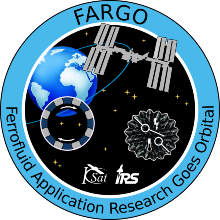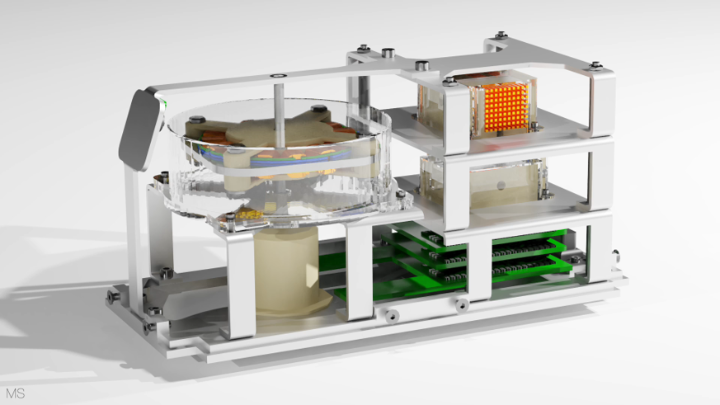On December 2, 2021, the Small Satellite Student Society at the University of Stuttgart (KSat e.V.) was selected by a jury of experts and following a two-day online selection process as one of four teams that will be allowed to send experiments to the International Space Station to be conducted there, as part of the second "Überflieger 2" competition, organized by the German Space Agency at DLR and the Luxembourg Space Agency (LSA).
Together with three other teams, they beat a total of eight teams from Germany and two from Luxembourg. "We received a lot of exciting experiment suggestions", reports Johannes Weppler, Project Manager of the "Überflieger 2" competition at DLR. The scope of the topics included everything from the symbiosis of plants and microorganisms, to innovative energy storage concepts and even new technologies for small satellites."
With the experiment FARGO (Ferrofluid Application Research Goes Orbital), the team from the University of Stuttgart now has a second opportunity to conduct an experiment under optimal utilization of the special conditions on the ISS.
“It is simply brilliant, and I am so proud that we managed to put together a diverse and competent team from the University of Stuttgart in a short period of time and that we were able to convince the expert jury at the "Überflieger 2" competition with our elaborate experiment," says Saskia Sütterlin, project manager for FARGO.
The ongoing pandemic situation has posed, and continues to pose, challenges in terms of development. The communication between team members, and their work must largely take place online, instead of using the meeting rooms, workshops, or laboratories at the university. This made the first team meeting after several weeks of intensive collaboration all the more interesting.
Based on the results of the first experiment, PAPELL (Pump Application using Pulsed Electromagnets for Liquid reLocation), in which a ferrofluid-based pump was tested at zero gravity, this time the team aims to investigate three more applications of ferrofluids under zero gravity conditions to explore their use for future space missions. The team now has a year to develop the experiment, supported by the Institute of Space Systems.
The team plans to test a thermal switch that controls the transfer of heat between two components, an electrical switch that closes and opens a circuit, and a new system for position control of small satellites. All the experiments are based on a ferrofluid technology, in which the ferrofluid can be manipulated by external magnetic fields to close a current or heat circuit, or in the case of the position control concept, to generate a turning moment. Ferrofluids are liquids that contain magnetic particles that react to external magnetic fields.
What all three applications have in common is that they have as few mechanical parts as possible, thus significantly reducing the risk of failure due to wear. Furthermore, the finished research apparatus must fit into a prefabricated container measuring 10 x 10 x 20 centimeters. "Fitting three aerospace applications, including control and measuring equipment, into this limited volume of just 2 liters is a major challenge. But we are delighted that we were able to convince the jury with our technical concept." Nico Heinz, co-lead mechanic FARGO
In late 2022 or early 2023, the crate will be sent to the ISS aboard a launch vehicle and operated autonomously for 30 days. The students from the student association KSat e.V. will be able to experience the launch into space live on site.
The German Physical Society (DPG) supported "Überflieger 2" by helping to select the experiments and publicizing the project. The technical implementation will be carried out by the company yuri GmbH from Meckenbeuren. The German-organized part of "Überflieger 2" is being financed with funds from the Federal Ministry for Economic Affairs and Energy (BMWi)
More information about the competition: Gehirnforschung und "Glücksklee" auf der Internationalen Raumstation - DLR Portal
| Contact | KSat e.V. Stuttgart, c/o Institute of Space Systems For students of the University of Stuttgart: ILIAS-Gruppe und Mentoring |
|---|



